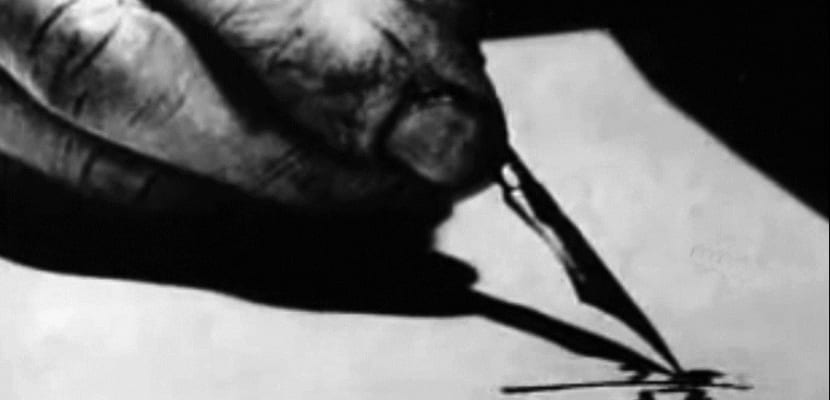
If I once told you about the many benefits of reading, today I come with news that will surely seduce those who love to write or, especially, those people who still resist express your emotions on paper.
And it is that writing, like many other facets of art, encompasses some psychological benefits scientifically tested and experienced in various workshops and cognitive therapies in which the objective is simply to let go, vomit tensions and release an unconscious that needs paper and pencil (almost better than a computer) to express itself.
All this without forgetting the existence of more than one study that has revealed a new discovery: writing can heal physical wounds. Yes Yes. . .
Full folios, healthy people

The Spanish essayist María Zambrano once said that «writing is defending the loneliness in which I live«, An appointment that would seem somewhat tragic if it weren't for the fact that the fact of writing, whether you are a professional writer, an amateur or simply a person with concerns, frees and helps us to face that microworld in which only we live with our reflections, traumas and joys.
And it is precisely to liberate this "loneliness" that has led many experts to enhance writing as a therapy that still many refuse to experiment, perhaps for fear of seeing their fears written down.
Nancy P. Morgan, the director of various Georgetown Cancer Center art programs, in Washington, stated that “The cognitive process of writing what one thinks has a calming effect. It can produce physical relaxation, lowering of blood pressure and improving sleep.
The writing has also been recurrent in various therapies with cancer patients, people who by writing for twenty minutes a day have managed to become abstract and even change their perception of their own illness.
Improvements have also been found in patients with HIV, pelvic and lumbar problems or arthritis.
And it is that, as many of you know, the psychological concerns the physical and vice versa, so emptying your concerns in front of a blank paper implies relaxing the mind and, with it, improving the state of the organism. In fact, a New Zealand medical psychologist, Elizabeth Broadbent, launched a workshop called 'Expressive writing and wound healing in older people«, Whose purpose was to bring together people over 64 who had just had a biopsy.
As a solution to heal the wound, they were proposed write for about twenty minutes a day on a blank piece of paper. Of the group that wrote about their traumas and sensations, 76,2% showed improvements in wound healing, compared to 42,1% of the group who preferred to forget emotional details.
New psychologists
It is not necessary that your reflections come out a best-seller, or a short story, simply limit yourself to expressing in words an opinion, a thought or that routine in which something does not work, because perhaps by contemplating the result you can get to notice what it is. the solution.
According to other therapies, the fact that the person write about your problem and come up with a happy ending for its history it provokes an unconscious stimulus of progress in the patient. In others, making a ball of paper with the writing becomes the best option, a symbolism that we break with those inner demons.
And you may wonder, isn't it better to sit on the psychologist's couch? Yes. . .but not. As curious as it may seem, the absence of an interlocutor in the writing process allows the subject to be free from prejudice to reveal their fears and problems, no matter how much experience the therapist inspires; the role continues to be an inanimate ally, ready to absorb all those inner fears. There are no witnesses, but only a sheet in which we can undress emotionally 100%.
The many psychological and physical benefits of writing can bring you can only be verified by those who risk relying on a blank paper as the best of psychologists. Because in addition to noticing improvements in your mood, there is also the possibility that this new therapy will release that writer that you still did not know you were.
No, you wouldn't be the first to happen.
Do you usually write as therapy?
IN MOMENTS OF GREAT TENSION OR DEPRESSION I ALWAYS WRITE AND EXPRESS WHAT I FEEL, IT IS A RELIEF OF THE SOUL ...
I agree with everything you say in your article. I went into a very strong depression and the fact of writing helped me a lot to overcome my fears and to be a person with great self-esteem.
I encourage everyone to give it a try. Worth it.
The truth is that yes, writing is always a liberation, whether it is about personal problems or fiction. Hugs at 2!
Many years ago on a lonely night I could not sleep. I got up and taking a sheet of paper and a pen I began to write. So I think that two hours after which I felt good ... That was due to those detailed ojas that garavatie and garavatie until they found a new balance.
You only need to improve your spelling, out of respect for those "ojas."
I write because I like it.
oy happy.
I agree with everything, I was in psychological treatment, I like to write, my problem is the lack of faith in what I do, it makes me let the subconscious surface is not useful, when writing I feel that nobody cares what I write .
It also depends on what you write Jose. If it is something personal you can focus it to see your problems with perspective and improve them, and even if you want to turn it into something more "narrative" you can spread it, there are many ways to do it 😉